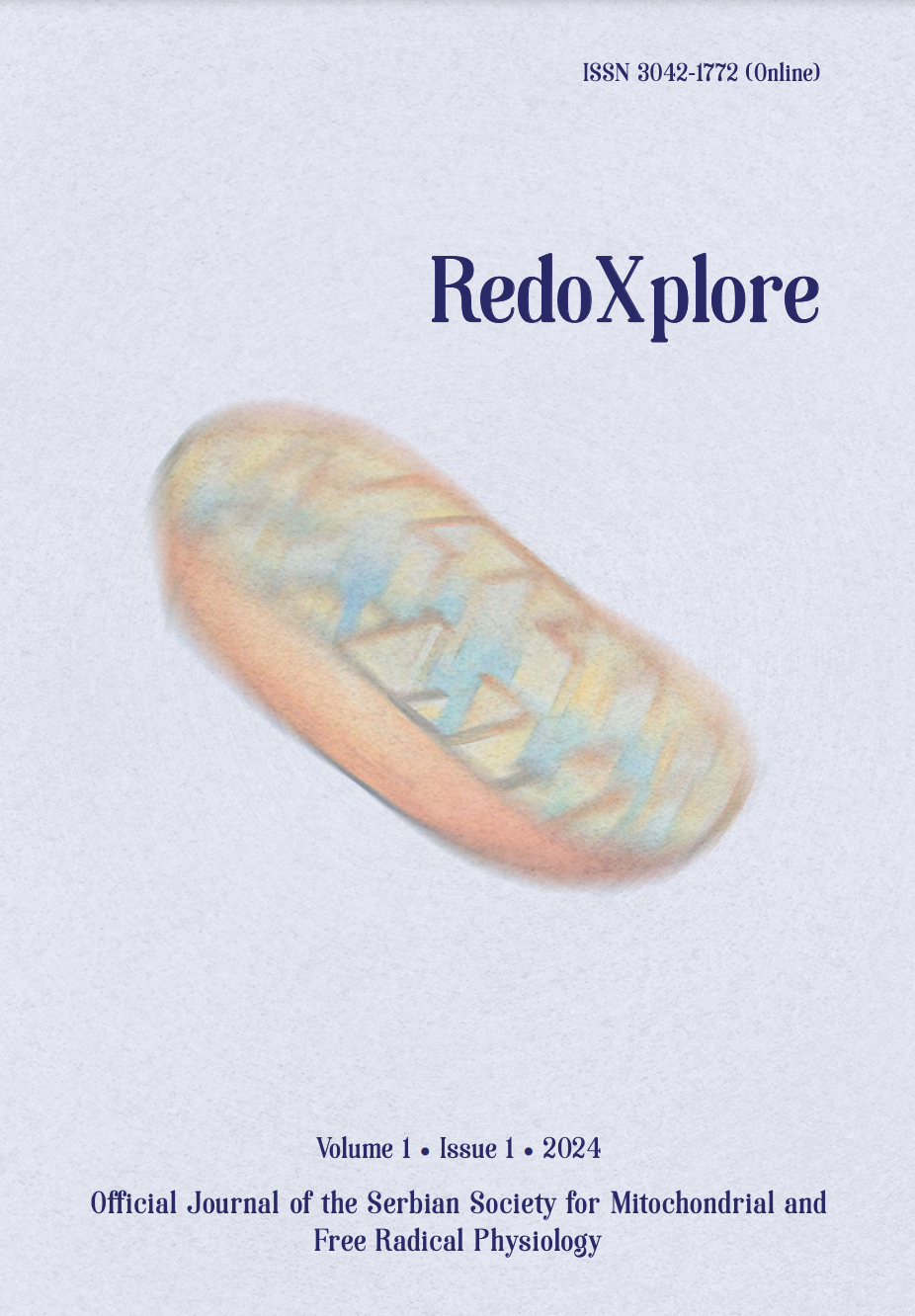
More articles from Volume 1, Issue 1, 2024
REDOX AND METABOLIC REPROGRAMMING OF BREAST CANCER CELLS AND ASSOCIATED ADIPOSE TISSUE - THE CORNERSTONES OF ADAPTIVE TUMOUR BEHAVIOUR
INSULIN MODULATES MITOCHONDRIAL STRUCTURAL AND FUNCTIONAL MOSAICISM IN BROWN ADIPOCYTES
NITRITE MITIGATES OXIDATIVE BURST IN ISCHEMIA/REPERFUSION IN BRAIN SLICES
NITRIC OXIDE, SUPEROXIDE AND PEROXYNITRITE – REDOX REGULATION OF THE CARDIOVASCULAR SYSTEM BY NITRO-OXIDATIVE STRESS AND S-NITROS(YL)ATION
DIETARY NITRATE AS PIVOT ON THE GUT MICROBIOTA-HOST REDOX COMMUNICATION
Citations

0
REDOX METABOLIC CHANGES IN TUMOR AND ASSOCIATED ADIPOSE TISSUE OF COLON CANCER PATIENTS
Institute for Biological Research "Sinisa Stankovic" - National Institute of Republic of Serbia, University of Belgrade , Belgrade , Serbia
Institute for Biological Research "Sinisa Stankovic" - National Institute of Republic of Serbia, University of Belgrade , Belgrade , Serbia
Faculty of Biology, University of Belgrade , Belgrade , Serbia
Clinical Hospital Centre Zemun, University of Belgrade , Belgrade , Serbia
Clinical Hospital Centre Zemun, University of Belgrade , Belgrade , Serbia
Institute for Biological Research "Sinisa Stankovic" - National Institute of Republic of Serbia, University of Belgrade , Belgrade , Serbia
Institute for Biological Research "Sinisa Stankovic" - National Institute of Republic of Serbia, University of Belgrade , Belgrade , Serbia
Faculty of Biology, University of Belgrade , Belgrade , Serbia
Editor: Bato Korac
Published: 29.08.2024.
Short oral presentations
Volume 1, Issue 1 (2024)
Abstract
Colorectal cancer presents a significant global health challenge, with a high mortality rate. It is the third most commonly diagnosed cancer and is therefore a major cause for concern. The development of colorectal cancer is multifaceted, involving a combination of genetic predispositions and lifestyle factors. The redox and metabolic states may influence the intricate process of colon cancer development. To gain a deeper understanding of the redox-metabolic profiles associated with colon cancer, a human study was conducted. In biopsies from patients with colon cancer, the antioxidant status: copper, zinc superoxide dismutase (CuZnSOD), manganese superoxide dismutase (MnSOD), catalase (CAT), glutathione peroxidase (GSH-Px), glutamate-cysteine ligase (GCL), thioredoxin (Trx) and lactate metabolism were examined in tumor and unaffected colon tissue (remote 15-20 cm) as well as in adipose tissue: proximal (near the tumour tissue), distal (remote 6 cm) and unaffected (remote over 6 cm). The protein levels of CuZnSOD, MnSOD, GSH-Px, and Trx are increased in the tumor tissue compared to the unaffected colon tissue. In addition, the expression of the lactate dehydrogenase (LDH) A isoform, the total activity of LDH and the lactate concentration are higher in transformed tumor tissue than in normal colon tissue. On the other hand, lactate concentration increases and several AD components (CuZnSOD, MnSOD, CAT, GSH-Px, GCL and Trx) decrease in adipose tissue with tumor proximity. Shifts in redox and lactate metabolism in tumor tissue associated with spatial changes in lactate and antioxidant enzymes gradients in adjacent adipose tissue clearly indicate a local redox metabolic interaction between tumor and tumor-associated adipose tissue in shaping the malignant phenotype in human colorectal cancer.
Citation
Copyright

This work is licensed under a Creative Commons Attribution-NonCommercial-ShareAlike 4.0 International License.
Article metrics
The statements, opinions and data contained in the journal are solely those of the individual authors and contributors and not of the publisher and the editor(s). We stay neutral with regard to jurisdictional claims in published maps and institutional affiliations.






